- Home
- China Miéville
The Scar Page 8
The Scar Read online
Page 8
They hear about the shelled submersibles from Salkrikaltor that cruise the villages of the Basilisk Channel. Patrolling a thousand miles of water, watching the nebulous borders of the cray commonwealth’s influence. Watching for intruders.
The hunters bicker and brood and caucus.
We know where he came from.
But perhaps he does not return.
There is uncertainty. To his home, or east—out?
The trail forks, and there is only one thing to do. The hunters separate into two contingents. One heads southwest for the shallow water, for Iron Bay and Tarmuth and the drooling dilute salt of the Gross Tar estuary, to watch and listen, to wait for word, to spy and hide, and seek word.
With a flutter of displaced water they are gone.
The other group, with a more uncertain task, heads away and down.
They swim low, heading for the crushing deeps.
Interlude II
Bellis Coldwine
Oh. Oh where are we going?
Locked in our cabins and questioned blank-faced, as if these murderous men these pirates were census takers or bureaucrats or . . . —Name? they ask, and—Occupation? Then they want to know my—Reason for heading to Nova Esperium? and I think I will laugh in their faces.
Where are we fucking going?
They take long notes, they itemize me on their printed forms, then turn to Sister Meriope and do the same for her. They respond the same way to the linguist and the nun, with little nods and points of clarification.
Why can we keep our things? Why do they not strip the jewelry from me rape me or run me through? No weapons, they tell us, and no money and no books, but our other belongings we can keep, and they rummage through our sea chests (a halfhearted search) and take out daggers and bills and monographs and dirty my clothes but leave what else they find. They leave letters, boots, pictures, and all accumulated tat.
I argue for my books. I can’t let you take them I say, let me keep them they’re mine, some I wrote, and they let me keep the blank-paged notebook but the printed ones, the stories the textbooks the long novel they take from me. Effortlessly. They don’t care when I show them that B. Coldwine is me. They take the Coldwines away.
And I don’t know why. I cannot make sense of what they are doing.
Sister Meriope sits and prays, muttering her sacred suras, and I am surprised and pleased that she is not weeping.
We are kept inside and time to time they come to us with tea and food, not rude nor pleasant, disinterested as zookeepers. I want to get out I tell them. I rap sharp on my door and I must visit the privy I say, and peer around the door frame and the guard in my corridor bellows at me to get inside, and brings me a bucket which Sister Meriope stares at in mortification. I don’t care, I was lying, I wanted to find Johannes or Fennec, I want to see what is happening elsewhere.
All over, sounds of feet and half-heard discussion in a language I almost understand.—North-north-east I hear and other side of the deck and—Ever? I couldn’t tell and—where’s His Guardship gone? and then I hear more that is opaque.
Through the porthole by my head I see nothing but squalls above water, darkness above and below. I smoke and smoke.
And when my cigarillos are finished I lie back and realize I’m not waiting to die, I don’t believe I’ll die, I am waiting for something else.
To arrive. To understand. To be at my destination.
I realize with some surprise as I watch sundown’s greasepaint that I am closing my eyes and I am bone tired and godspit really? really will I? I will, I will sleep I
sleep
unquiet but long, sleeping eyes flickering with Meriope’s religious whimpers, opening sometimes but still
asleep
till with a rush of panic I sit up and look out at a brightening sea.
Morning is coming. I have missed the night, hiding away in my dreaming head.
I dress carefully. I rub my long boots clean. I paint my face as always and tie back my hair.
It is half past six when a cactus man knocks at our door and brings us gruel. As we sip he tells us what will happen.—We are nearly arrived he says.—When we have tied up follow the other passengers, listen for your names and go where you are told, and you’ll . . .” but I lose track, I lose track, we will what? Will we understand then? Will we know then what is happening?
Where are we going?
I pack my belongings away and prepare to disembark somewhere, somewhere. I am thinking of Fennec. What is he doing and where is he, so quiet when the captain was killed (blood bursting)? He would not want it known that he has a commission, that he can command ships, reschedule ocean crossings.
(I hold him in my hands.)
Out. Into a quick bright wind. It worries at me insistently.
My eyes are like a cave-thing’s. I have learnt to see in the drab brown light of my cabin and this morning startles me. My eyes are teary and I blink and blink and the sea clouds run from me above. Everywhere I can hear the soft applause of waves. I can taste salt in my air.
Around me are the others, Mollificatt and Cardomiums one and two. Murrigan and Ettenry and Cohl Gimgewry Yoreling Tearfly my Johannes glimpsing at me swiftly and with a sudden smile before swept away in a crowd, and Fennec somewhere his head down still, and all of us look made of roughcut paper in this light. We are made of baser stuff than the rest of the day. It ignores us with the arrogance of a fucking child.
I want to shout to Johannes but he’s been taken away by the current of us and with my newly clear eyes I look and look.
I struggle with my sea chest, stumbling, hobbling the deck’s length. I feel battered by the light and air and I look up again and see birds arcing. I struggle forward and keep them in my sights and they wheel over us, passing to starboard, and they head erratically for the horizon and I see masts in their flight path. I have been avoiding this. I have not yet looked to the side of the ship, I have not seen where we are. My destination has been skulking beyond the corner of my eye but now as I watch the gulls it leaps into view.
It is everywhere. How could I not see?
Someone is shouting names as we shuffle past, splitting us into groups and handing out instructions, complex orders but I am not listening because I am looking out over
Dear Jabber
My name is called and I am here next to Johannes again but I am not looking at him because
I am watching
mast upon mast and sail and tower and
on and more
We are here
beside this forest
Godspit Jabber and fuck
a trick a trick of perspective
a city that moves and ripples and slops endlessly side to side
—Miss Coldwine someone says coldly but I cannot, not now I am looking, and I have put down my chest and I am looking
and someone is shaking Johannes’ hand and he stares at them bemused as they speak to him.—Dr. Tearfly, you are most welcome this is indeed an honor, but I am not listening because we are here we have arrived and look at it all look at it
Oh I’ll I’ll I could laugh or spew as my stomach yaws look we are here we are here
We are here.
Part Two
Salt
Chapter Six
There were lamps under the water. Green, grey, cold white, and amber globes of cray design, tracing the undersides of the city.
Light prickled on suspended particles. It came not only from the thousand knots of illumination but from corridors of early sunlight that angled down, picking out passages from the waves to the deep water. Fish and kree circled them and passed through them dumbly.
From below, the city was an archipelago of shadows.
It was irregular and sprawling and hugely complex. It displaced currents. Jags of keel contradicted each other in all directions. Anchor chains trailed like hair, snapped and forgotten. From its orifices billowed refuse; fecal matter and particulate, and oil eddying uneasily and rising in smal
l slicks. A constant drool of trash fouled the water and was swallowed by it.
Below the city there were a few hundred yards of rapidly thinning light, then miles of dark water.
The underside of Armada was crisscrossed with life.
Fish eddied through its architecture. Fleeting newtlike figures moved with intellect and purpose between boltholes. There were wire mesh cages tucked into hollows and dangling from chains, crowded with fat cod and tunny. Cray dwellings like coral tumors.
Beyond the edges of the city, and below it at the far reaches of light, huge half-tame seawyrms corkscrewed and fed. Submersibles droned—rigid shadows. A dolphin made constant vigilant rounds. A moving ecology and politics were tethered to the city’s calcified base.
The sea around it resonated with noise made physical: staccato clicks and the vibrations of pounding metal, the swallowed sound of watery friction as currents rubbed against each other. Barks that dissipated when they reached the air.
Among those that gripped and dangled underneath the city were scores of men and women. They fumbled in dragged-out time, clumsy beside the elegant fronds and sponges.
The water was cold, and the topsiders wore rubberized leather suits and massive helmets of copper and tempered glass, tethered to the surface by tubes of air. They hung on ladders and guy ropes, poised precariously over an unthinkable space.
Stuck tight inside their helmets, they were cut off from sound, and each of them moved ponderously alongside their fellows, quite alone. They clambered like lice across a pipe that poked into the dim sea like an inverted chimney. It was a thriving patchwork of algae and shells in extraordinary shades. Weeds and stinging filigree smothered it like ivy and dangled out and down, fingering the plankton.
There was a diver whose chest was bare, from which two long tentacles extruded, waving in the current, but also according to their own faint inclinations.
It was Tanner Sack.
Pumping its tail, the dolphin plunged up past the edges of the city, out and up toward the light. He burst through decreasing water pressure and out into the air, jackknifing, suspended in spray, fixing the city with a cunning eye.
Below again, he curled back through striae of water. Huge shapes were dimly visible some way off, unclear through water and a shimmering of thaumaturgy. Patrolled by tethered sharks, they were not to be investigated. The eye could not focus on them.
There were no divers upon them.
Bellis came out of sleep to the sound of voices.
It was weeks since she had arrived in Armada.
Every morning was the same. Waking and sitting up, waiting, looking around her little room with an incredulity, a shuddering disbelief that would not stop. It welled up even stronger than the longing with which she missed New Crobuzon.
How did I get here? The question was constant in her.
She opened her curtains, gripped her windowsill, and stood staring out over the city.
When they had arrived, on the first day, they had stood huddled with their belongings on the Terpsichoria’s deck, surrounded by guards, and by women and men with checklists and paperwork. The faces of the pirates were hard, made cruel by weather. Through her fear, Bellis watched carefully, and could make no sense of them. They were disparate, a mixture of ethnicities and cultures. Their skins were all different colors. Some were scarified in abstract designs; some wore batik robes. They looked as if they shared nothing except their grim demeanor.
When they stiffened suddenly into a kind of attention, Bellis knew their superiors had arrived. Two men and a woman were standing by the ship’s rail. The murderer—the grey-armored leader of the raiding party—stepped up to join them. His clothes and sword were now quite clean.
The younger man and the woman stepped forward to the swordsman. When Bellis saw them she could only stare.
The man wore a dark grey suit; the woman a simple blue dress. They were tall and held themselves with immense authority. The man had a trim mustache and an easy arrogance. The woman’s features were heavy and irregular, but the flesh of her mouth was sensual, the cruel cast of her eyes compelling.
What had made Bellis stare at them both with fascination and distaste, what commanded her attention, were the scars.
Curling down the outside of the woman’s face, from the corner of her left eye to the corner of her mouth. Fine and uninterrupted. Another, thicker and shorter and more jagged, swept from the right side of her nose across her cheek and curled up as if to cup her eye. And others, contoured to her face. They disfigured her ocher skin with esthetic precision.
Flickering her eyes from the woman to the man, Bellis had felt something curdle inside her. What fucking unhealthiness is this? she had thought uneasily.
He was adorned with identical, but mirrored marks. A long curved cicatrix down the right side of his face, a shorter flourishing cut below his left eye. As if he were the woman’s distorted reflection.
As Bellis watched the wounded pair, aghast, the woman spoke.
“You will have realized by now,” she said in good Ragamoll, projecting her soft voice so that everyone could hear, “that Armada is not like other cities.”
Is that a welcome? Bellis had thought. Was that all that the traumatized and bewildered survivors of the Terpsichoria were to be offered?
The woman had continued.
She told them about the city.
Sometimes she was silent, and without a pause the man would speak. They were almost like twins, finishing each other’s sentences.
It had been hard to listen to what they were telling her. Bellis was agog at the feelings she saw pass between the scarred man and woman every time they glanced at each other. Above all a hunger. Bellis had felt unstuck in time: as if she were dreaming this arrival.
Later, she would realize that she had absorbed much of what had been said, that it had passed into her and been processed at some level below consciousness. It came out as she began to live in Armada, against her will.
At the time, all she had been aware of was the couple’s shared intensity, and the stunned excitement that greeted the woman’s final sentence.
The words had reached Bellis full seconds after they were spoken, as if her skull were some thick medium through which sound traveled sluggishly.
There was a massed gasp and a whoop and then a swell of incredulous cheering, a huge breaking wave of joy from the hundreds of exhausted Remade prisoners who stood shivering and stinking. It rose and rose, at first tentative and then rapidly delirious with triumph.
“Human, cactacae, hotchi, cray . . . Remade,” the woman had said. “In Armada you are all sailors and citizens. In Armada you are not distinguished. Here you are free. And equal.”
There, finally, was a welcome. And the Remade accepted it with loud and tearful thanks.
Bellis had been herded away with her random companions, out into the city where the men and women of the city’s trades were waiting with contracts and hard, eager looks. And as she shuffled out of the room, she looked back at the group of leaders and saw with astonishment that someone had joined them.
Johannes Tearfly was looking down, totally bewildered, at the hand that the scarred man proffered—not snubbing it, but as if he could not think what he was supposed to do with it. The elderly man who had stood with the murderer and the scarred couple stepped forward, stroking his bright white beard, and greeted Johannes loudly by name.
That was all Bellis had seen or heard before she was taken away. Off the ship, out into Armada, into her new city.
A flotilla of dwellings. A city built on old boat bones.
Everywhere battered clothes shook and dried in the constant wind. They ruffled in Armada’s alleyways, by tall brickwork, steeples, masts, and chimneys and ancient rigging. Bellis looked from her window across the vista of reconfigured masts and bowsprits, a cityscape of beakheads and forecastles. Across many hundreds of ships lashed together, spread over almost a square mile of sea, and the city built on them.
Cou
ntless naval architectures: Stripped longships; scorpion galleys; luggers and brigantines; massive steamers hundreds of feet long down to canoes no larger than a man. There were alien vessels: ur-ketches, a barge carved from the ossified body of a whale. Tangled in ropes and moving wooden walkways, hundreds of vessels facing all directions rode the swells.
The city was loud. Tethered dogs, the shouts of costermongers, the drone of engines, hammers and lathes, and stones being broken. Klaxons from workshops. Laughter and shouting, all in the variant of Salt, the mongrel sailors’ tongue, that was the language of Armada. And below those city sounds the throaty noise of boats. Complaining wood and the snaps of leather and rope, the percussion of ship on ship.
Armada moved constantly, its bridges swinging side to side, its towers heeling. The city shifted on the water.
The vessels had been reclaimed, from the inside out. What had once been berths and bulkheads had become houses; there were workshops in old gundecks. But the city had not been bounded by the ships’ existing skins. It reshaped them. They were built up, topped with structure; styles and materials shoved together from a hundred histories and esthetics into a compound architecture.
Centuries-old pagodas tottered on the decks of ancient oarships, and cement monoliths rose like extra smokestacks on paddlers stolen from southern seas. The streets between the buildings were tight. They passed over the converted vessels on bridges, between mazes and plazas and what might have been mansions. Parklands crawled across clippers, above armories in deeply hidden decks. Decktop houses were cracked and strained from the boats’ constant motion.
Bellis could see the awnings of Winterstraw Market: hundreds of jolly boats and flat-bottomed canal runners, none more than twenty feet long, filling the spaces between grander vessels. The little boats bumped each other constantly, tethered together with chains and crusted knotwork. The stallholders were opening up, garlanding their little shop boats with ribbons and signs and hanging up their wares. Early shoppers descended to the market from surrounding ships by steep rope bridges, stepping expertly from boat to boat.

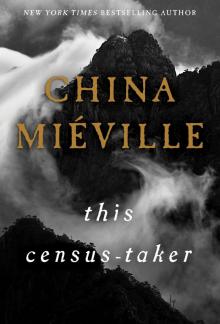 This Census-Taker
This Census-Taker Jack
Jack October: The Story of the Russian Revolution
October: The Story of the Russian Revolution The City & the City
The City & the City Looking for Jake: Stories
Looking for Jake: Stories Perdido Street Station
Perdido Street Station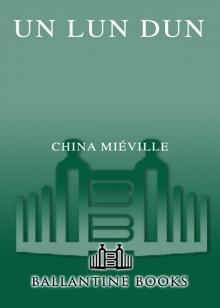 Un Lun Dun
Un Lun Dun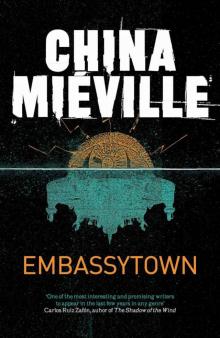 Embassytown
Embassytown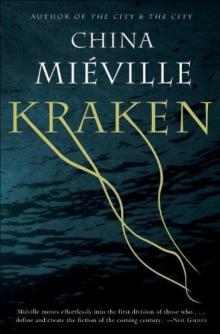 Kraken
Kraken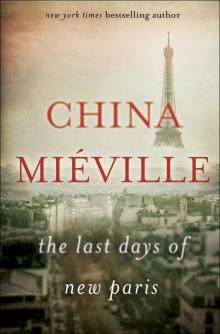 The Last Days of New Paris
The Last Days of New Paris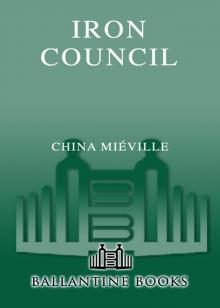 Iron Council
Iron Council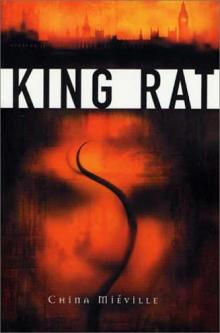 King Rat
King Rat Three Moments of an Explosion
Three Moments of an Explosion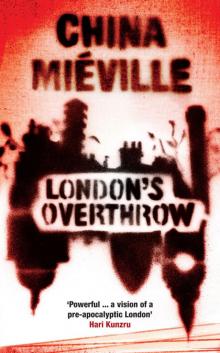 London's Overthrow
London's Overthrow October
October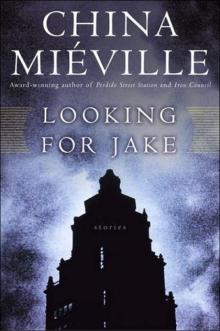 Jack (new crobuzon)
Jack (new crobuzon) Looking for Jake and Other Stories
Looking for Jake and Other Stories Looking for Jake
Looking for Jake